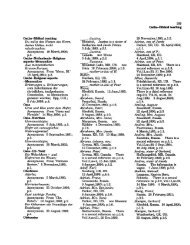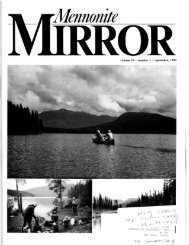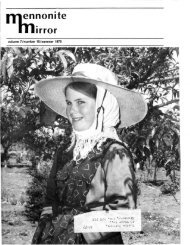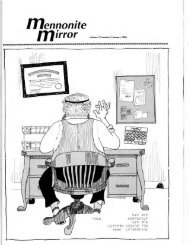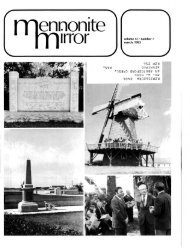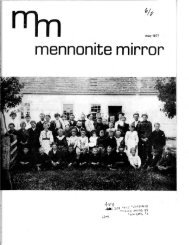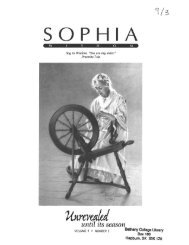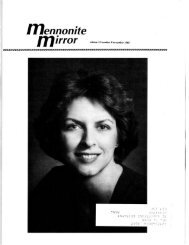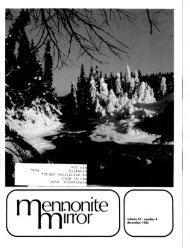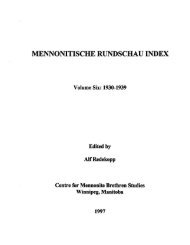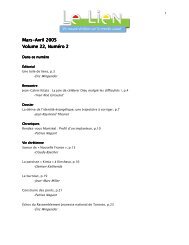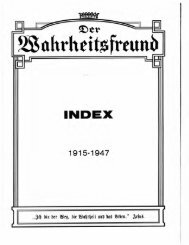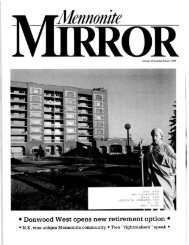No. 1 - Canadian Conference of Mennonite Brethren Churches
No. 1 - Canadian Conference of Mennonite Brethren Churches
No. 1 - Canadian Conference of Mennonite Brethren Churches
You also want an ePaper? Increase the reach of your titles
YUMPU automatically turns print PDFs into web optimized ePapers that Google loves.
Symphony Orchestras.<br />
Mr. Horch remains high in his praise <strong>of</strong><br />
Hugh Ross: "Of all the people I've studied<br />
with, I still don't know <strong>of</strong> anyone who<br />
came near him in the power <strong>of</strong> communication,<br />
in artistic strength and power. His was<br />
not just academic music-making; it was total<br />
communication. From him, too, I learned<br />
that the secret <strong>of</strong> great art is to conceal the<br />
art." As his own career was later to demon·<br />
strate, the young chorister was an impressionable<br />
student and a faithful disciple <strong>of</strong><br />
the Ross philosophy.<br />
The art <strong>of</strong> conducting combined the skills<br />
<strong>of</strong> stage and the concert hall, and it provided<br />
this "belated Romanticist" with the ideal<br />
vehicle for self-expression and communication:<br />
"Something had to get through from<br />
me to the singers to the audience - and<br />
music was the means to do that."<br />
There were other early influences in Mr.<br />
Horch's life. His mother was "a pragmatic<br />
person who would have liked us all to be<br />
farmers; her moral influence was strong."<br />
His father, a craftsman in wood by trade,<br />
was also an organist who felt comfortable<br />
with a wide range <strong>of</strong> music. "He accepted<br />
music as an art in its own right, without the<br />
kind <strong>of</strong> religious pragmatism that the church<br />
demanded." Although he gratefully acknow·<br />
ledges both influences, Mr. Horch concedes<br />
that his father's view <strong>of</strong> art won out in the<br />
end.<br />
Perhaps stronger than the influence <strong>of</strong> any<br />
one person was the influence <strong>of</strong> a home<br />
environment steeped in the broad traditions<br />
<strong>of</strong> Lutheran culture, a culture that did not<br />
make sharp distinctions between sacred and<br />
secular music. The Horch children took<br />
naturally to the works <strong>of</strong> such musical<br />
giants as Bach, Beethoven and Wagner, and<br />
they were encouraged to master the rudiments<br />
<strong>of</strong> several musical instruments. "My<br />
father bought me nearly every instrument<br />
I asked for, and what he didn't buy I begged,<br />
borrowed or ... rented."<br />
An older brother, Edward, played the<br />
'cello and piano; Emily played piano and<br />
organ. Two younger brothers are today<br />
widely known in Manitoba music circles,<br />
Emmanuel as a violinist and Albert as a<br />
pr<strong>of</strong>essional flautist. Both are highly successful<br />
music teachers.<br />
From this matrix <strong>of</strong> interests and<br />
influences the 21-year-old singer and jack<strong>of</strong>-all-instruments<br />
emerged in 1928 to begin<br />
a career in teach ing. For seven years he was<br />
choral director and teacher <strong>of</strong> music theory<br />
Ben Horch<br />
For over 40 years, Benjamin Horch has served Manitoba and the Manitoba <strong>Mennonite</strong>s<br />
through distinguished leadership in the field <strong>of</strong> choral and symphonic music. Born in<br />
Russia in 1907 <strong>of</strong> German parentage, Mr. Horch arrived in Canada in 1909. After a number<br />
<strong>of</strong> years <strong>of</strong> private study in voice and music theory, he served for seven years as choral<br />
director and teacher <strong>of</strong> music theory at the Winnipeg Bible Institute (now Winnipeg Bible<br />
College, Otter bourne) an interdenominational school. Four years <strong>of</strong> formal music studies<br />
followed this period at the Bible Institute <strong>of</strong> Los Angeles (now Biola College) in church<br />
music, piano, conducting and history. In this period he was active as a student choral<br />
director in various Baptist and Quaker chruches.<br />
In 1943 Mr. Horch returned to Manitoba, and for the next 12 years - except for a<br />
Sabbatical leave to study at the Detmold Akademie <strong>of</strong> Musik - he was Director <strong>of</strong> the<br />
Music Department at <strong>Mennonite</strong> <strong>Brethren</strong> Bible College. At Detmold he came under the<br />
tutelage <strong>of</strong> Kurt Thomas, the thirteenth cantor <strong>of</strong> St. Thomas since ,J.S.·Bach. During this<br />
twelve-year period he conducted both the <strong>Mennonite</strong> <strong>Brethren</strong> Bible College Oratorio Choir,<br />
College A Capella Choir, and the <strong>Mennonite</strong> Community Choir in Winnipeg.<br />
He founded and conducted the <strong>Mennonite</strong> Symphony Orchestra (an orchestra that for<br />
some years provided the Winnipeg Symphony Orchestra with a "local stock" <strong>of</strong>pr<strong>of</strong>essional<br />
musicians). In the summer interims (1943-1950) he was also the leading "Kurseleiter"<br />
(music clinitian, resource person, conductor <strong>of</strong> choral festivals) for the <strong>Mennonite</strong> <strong>Brethren</strong><br />
<strong>Conference</strong> in Canada, a position that brought him into close contact with choir directors<br />
and musicians in <strong>Mennonite</strong> constituencies in Ontario and in the four provinces <strong>of</strong> western<br />
Canada. In this capacity he also served as one <strong>of</strong> the musical editors <strong>of</strong> the <strong>Mennonite</strong><br />
<strong>Brethren</strong> Gesangbuch (Hymnary).<br />
Since 1955, in addition to conducting choirs in Altona and Winnipeg, Mr. Horch has<br />
devoted most <strong>of</strong> his energies to the field <strong>of</strong> broadcasting. He was program director <strong>of</strong><br />
serious music at KWSO, California (1955-57). In Manitoba he served the cause <strong>of</strong> broadcast<br />
music from 1957 to 1973 - the last thirteen years as a CBC producer <strong>of</strong> serious music<br />
programming. At the CBC he also produced a wide range <strong>of</strong> LP stereo recordings with<br />
Winnipeg artists <strong>of</strong> both national and international stature.<br />
Although formally retired since June 1973 Mr. Horch continues with the CBC as a freelance<br />
broadcaster. He is a member <strong>of</strong> the board <strong>of</strong> directors <strong>of</strong> the Winnipeg Symphony<br />
Orchestra and a member <strong>of</strong> the Program Committee. He is presently a music consultant to<br />
the editorial Committee charged with the compilation <strong>of</strong> the first Encyclopedia <strong>of</strong> Music<br />
in Canada to be published in 1978.<br />
He begins a new appointment in the fall <strong>of</strong> 1974 as conductor <strong>of</strong> the Steinbach Community<br />
Orchestra. His wife, Esther Horch, has taught hymnology at both MBBC and CMBC<br />
and also acted as a consultant to the editors <strong>of</strong> the recent M.B. Gesangbuch. For the last<br />
15 years she has been pr<strong>of</strong>essionally involved in social work institutions.<br />
14/ mennonite mirror I october 1974<br />
at the Winnipeg Bible I nstitute (now Winnipeg<br />
Bible College). and for eleven years -<br />
until 1939 - he taught voice. ("I was a<br />
lousy voice teacher," he says in retrospect.)<br />
At approximately this time he also formed<br />
and conducted the Wayside Chapel Orchestra<br />
("I t was way out, believe me"), a group <strong>of</strong><br />
about 30 players. The orchestra had as its<br />
base the <strong>No</strong>rthend MB Church and it<br />
forayed frequently to Winkler and other<br />
southern-Manitoba towns. "The group played<br />
everything," says Mr. Horch with a bemused<br />
smile; "we played fox trots, vox trots,<br />
waltzes and 'He is Coming Soon'." Although<br />
Mr. Horch refers to this early effort as "an<br />
abortive attempt," he admits that in his own<br />
church "there was very little criticism, no<br />
matter how the feet started to go."<br />
Looking back on this first decade <strong>of</strong><br />
teaching and conducting, Mr. Horch assesses<br />
his apprenticeship in this way: "That period<br />
ended in the sure knowledge that I had an ,;,<br />
awful lot to learn about music and also in<br />
the knowledge that I could not get the<br />
training in Canada."<br />
His ardour only slightly dampened, Mr.<br />
Horch left Winnipeg in 1939 to study music<br />
at the Bible Institute <strong>of</strong> Los Angeles (now<br />
Biola College). After four years <strong>of</strong> study he<br />
was invited by Rev. A. A. Kroeker to return<br />
to Manitoba and to divide his pr<strong>of</strong>essional<br />
time between teaching music at the Winkler<br />
Bible Institute and organizing a music program<br />
in the Winkler public school system.<br />
During the summer months (1943·1950)<br />
he toured Ontario and western Canada in<br />
his capacity as Kurseleiter. The choral workshops<br />
that he conducted stimulated the need<br />
for a music department in the <strong>Mennonite</strong><br />
<strong>Brethren</strong> Bible College and, as a result, in<br />
1944 Mr. Horch was appointed chairman <strong>of</strong><br />
the M.B. Bible College music department, a<br />
position that he held until 1955.<br />
These years - immediately after his undergraduate<br />
studies, and while he was working<br />
intimately with <strong>Mennonite</strong> young people<br />
from across western Canada - confirmed<br />
and brought to a focus several <strong>of</strong> Mr. Horch's<br />
most deeply-held convictions about the<br />
role <strong>of</strong> the <strong>Mennonite</strong> musician and about<br />
the nature and function <strong>of</strong> music in <strong>Mennonite</strong><br />
life and worship.<br />
Next Month: Benjamin Horch's Views on<br />
Music.<br />
Comment in the<br />
Winnipeg Free Press<br />
on the <strong>Mennonite</strong> Mirror:<br />
In an article on ethnic papers in the July 13,<br />
1974 issue <strong>of</strong> the Winnipeg Free Press,<br />
staff writer Lee Schacter observed that<br />
the <strong>Mennonite</strong> Mirror is "Ilvely and alert ....<br />
The magazine is half staff-written, half<br />
free-lance. Poetry flows in, in surprising<br />
volume. The staff, which includes a number<br />
<strong>of</strong> pr<strong>of</strong>essional people, newspaper people an<<br />
artists, donate their services free and do th~<br />
work in the.ir spare time." She conclude!<br />
that "through the (Mennonitische) Rund<br />
schau and the <strong>Mennonite</strong> Mirror, <strong>Mennonite</strong>'<br />
receive their intellectual and their spiritua<br />
nourishment. It's a neat combination, anI<br />
pleases editors and readers alike."



